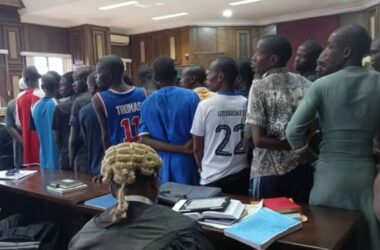The recent discussions surrounding the establishment of Sharia Arbitration Panels in the South-West have sparked debates and concerns about their implications for religious harmony.
However, Barrister Adam Oloriaje, Executive Secretary General of the Muslim Lawyers Association, has assured that these panels do not pose a threat to peace and coexistence in the region.
Speaking on Inside Sources with Laolu Akande on Channels Television on Sunday, Oloriaje emphasized that Sharia is not exclusive to the North but is an essential aspect of the Muslim faith. According to him, “Sharia is not for the North. Sharia is for Muslims. It’s to guide our lifestyle. It is the purpose of our existence. A Muslim cannot exist fully without complying with the tenets and commands of his religion.”
He further explained that the issue at hand is not about introducing Sharia Courts in the South-West but rather recognizing the already existing Sharia Arbitration Panels. “The issue at stake now is not even about having Sharia Courts in the South-West. It’s about Sharia Arbitration Panels, which have been in existence. In Lagos State, for instance, these panels have been operational for the past 22 years. As I’m talking to you, every weekend, Sharia Arbitration Panels sit in Lagos to resolve disputes related to personal status—anything that has to do with personal law,” he noted.
Oloriaje stressed that participation in these panels is purely voluntary. “It’s not something you’re compelled to submit to. You have autonomy, you have consent. Even when you’re a Muslim, you’re not compelled.”
Providing an example, he explained, “A marriage conducted under Islamic law—in the mosque by Muslims—follows Islamic regulations. If that marriage encounters issues, Islam has already provided every necessary regulation to guide it. Islam has given regulations to everything.”
Dr. David Okoror, a security and governance strategist, questioned the necessity of Sharia Arbitration Panels in states beyond Lagos, where disputes have historically been resolved without them. “Over a long period of time, Muslims and other religions have lived together. In states other than Lagos, how were they able to manage marriage issues, land issues? So, if they have handled these well, why suddenly is there this talk about ‘we must have the Sharia Council, Courts, or Committees’ in the South-West? For me, there is no firm legal ground.”
Similarly, Dr. Fola Ojo, a newspaper columnist and journalist, expressed concerns about the emphasis on religious institutions in modern society. “I’m really surprised that in 2025, when nations around the world are growing, when they are empowering their people, when education is being made available, healthcare is being made available, we are still talking about religion!”
Tracing the origins of the discussions, Ojo pointed out that the Supreme Sharia Council, which plays a significant role in advocating for these panels, has been in existence for decades. “If you want to look at the origin of this stuff, there is a Supreme Sharia Council. This mother group was incorporated in 2005. It’s just a group of like minds.”
As debates continue, it is evident that the core of the controversy lies in the intersection between religious practices and legal frameworks. While proponents argue that Sharia Arbitration Panels are an internal mechanism for dispute resolution among willing Muslims, critics worry about their broader societal implications.
The South-West, known for its religious diversity and tolerance, faces the challenge of ensuring that any religious-based arbitration aligns with constitutional provisions and does not create divisions. Ultimately, the emphasis remains on peaceful coexistence, voluntary participation, and adherence to the rule of law.










